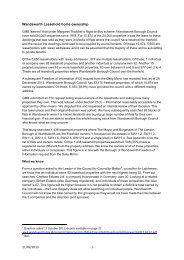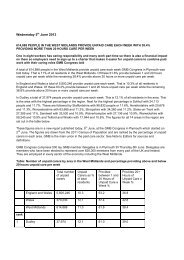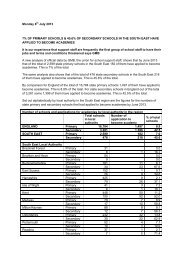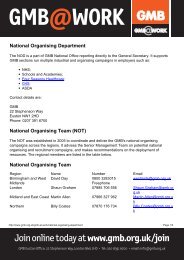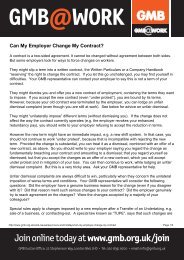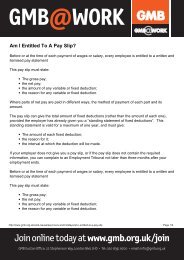WO toolkit 2012 complete.pdf - GMB
WO toolkit 2012 complete.pdf - GMB
WO toolkit 2012 complete.pdf - GMB
You also want an ePaper? Increase the reach of your titles
YUMPU automatically turns print PDFs into web optimized ePapers that Google loves.
SECTION 5.23<br />
23. Can I take time off to look after a dependant?<br />
You can have a reasonable amount of unpaid time off work to take action which is necessary to deal<br />
with an unexpected or sudden problem and make any necessary longer term arrangements.This covers<br />
the following:<br />
• To provide assistance when a dependant,or somebody who reasonably relies you,falls ill(whether<br />
physically or mentally),is injured or assaulted; or a dependant gives birth(this may fall within<br />
paternity leave).<br />
• To make arrangements for the provision of care for a dependant,or any person who reasonably<br />
you,who is ill or injured<br />
• To make arrangements when a dependant dies–this could include funeral arrangements,executor<br />
functions.<br />
• To make arrangements when a dependant’s care unexpectedly breaks down–this could include<br />
child,disabled or elderly care.It also includes making arrangements for the provision of care for<br />
the illness or injury of any person who reasonably relies on the employee.<br />
• To deal with an unexpected incident during the time when a school has responsibility for your<br />
child.<br />
Dependants are defined as:<br />
• Spouse.<br />
• Child(no age defined).<br />
• Parent.<br />
• A person who lives in the same household,but is not a lodger,employee or boarder(this would<br />
include live-in unmarried partners,same sex partners,relatives).<br />
A dependant also includes anyone who reasonably relies on you for assistance and may include the<br />
following:<br />
• Someone for whom you are the primary carer or the only person who can help in an emergency e.g.<br />
a relative who you look after or an elderly neighbour living alone who falls and breaks a leg and you<br />
are the closest on hand at the time of the fall.<br />
You must tell your employer as soon as possible the reasons for your absence and how long you are likely<br />
to be off.This may not,according to the circumstances,happen until after you return to work.The leave<br />
is unpaid and it is envisaged that it will be no longer than one or two days in length.<br />
You are protected against dismissal or any detrimental act,including denial of promotion,facilities or<br />
training opportunities,by the employer for taking dependants’leave.<br />
If your employer has unreasonably refused to allow you to take dependants’leave,you can make a<br />
complaint to an employment tribunal.Although you should initially try to resolve the issue through the<br />
grievance procedure,claims regarding dependants’leave are not covered by the statutory grievance<br />
procedures.If the matter is not resolved internally you must make your tribunal claim within three<br />
months of the refusal.<br />
Negotiate to ensure that leave is paid; to extend coverage to special leave entitlements including<br />
paid paternity leave,bereavement leave,hospital visits etc.<br />
REMEMBER: there may be more than one person affected by this issue.<br />
Consider calling a meeting to advise,recruit and organise.



